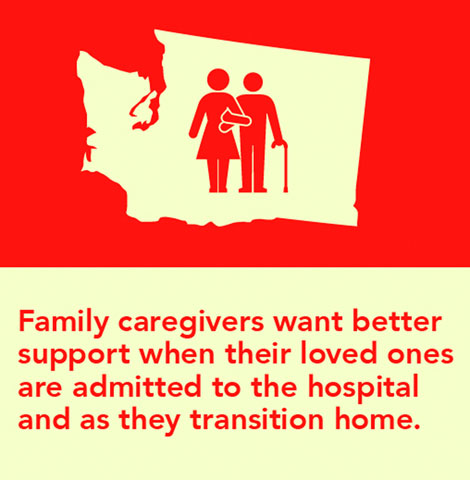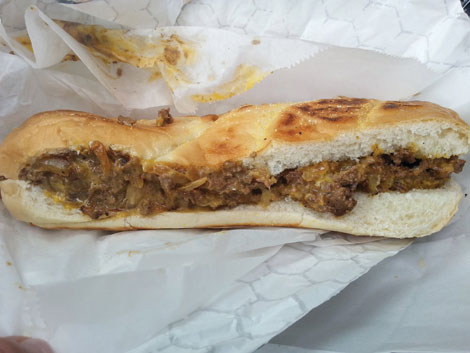Help requested for ‘silent army’ of family caregivers
A new AARP survey emphasizes the role Washingtonians play as family caregiver and also shows overwhelming support from voters for measures to better support those who care for relatives.
“A silent army of family caregivers are the unheralded backbone of our state’s care system, providing more than two-thirds of home care for older Washingtonians and adults with disabilities,†said Doug Shadel, state director of AARP Washington, which claims to represents more than 945,000 state residents age 50 and older. “If you’re not a caregiver now, you were one in the past, or you’ll likely be one in the future. And while caregivers say they wouldn’t have it any other way, families incur physical, emotional and financial strains through this labor of love. In short, family caregivers need help.â€
The survey of 800 Washington registered voters 45 and older was done in support of legislative efforts on behalf of caregivers. Â According to AARP, the survey found family caregivers are providing care in a variety of ways. More than eight in 10 report their duties include assisting their loved ones with transportation (88 percent), shopping (88 percent), and household chores (83 percent).
In addition, 81 percent assist with meal preparation, while 64 percent help manage finances and 51 percent assist with bathing and dressing.
According to the survey, those duties are taking a toll on family caregivers. Respondents who are current or past caregivers report feeling stressed, both emotionally (70 percent) and financially (29 percent). Caregivers say they it’s difficult to get rest (56 percent), and express feeling stressed about trying to balance their work and family (60 percent) and taking care of their household (45 percent).
One of the more noteworthy findings of the survey, according to AARP, shows Washington caregivers are also heavily involved in the medical side of caring for their loved ones. Two-thirds of caregivers assist with medication management (68 percent) and overseeing other nursing and medical tasks such as wound care, IVs and injections (67 percent).
However, much of that care is being provided with little, if any, training or support, AARP officials said. As an example, they cited Shelton resident Susan Day.
Last spring,Day’s husband, Edward, spent more than a month in the hospital – half of which was spent in intensive care, including five days when he wasn’t expected to live. He pulled through, but the struggle wasn’t over.
During Edward’s final week in the hospital, Susan asked repeatedly for time and training on the procedures she would need to perform once she got her husband home, including injections, wound care and managing multiple medications. She knew it would be a challenge, given their home was more than a two-hour drive from his doctors in Seattle. As it turned out, his hospital discharge “was chaotic, inadequate, and poorly timed for everyone,†Susan said.
“We learned a lot through trial-by-fire,†she said. “Fortunately, Edward has a tough character, but the lack of information and training led to huge amounts of unnecessary stress and grief.â€
Shadel said the “burden of performing nursing tasks without proper guidance or training is tremendous. It not only puts extra stress on the caregiver, it can result in the patient being readmitted to the hospital.â€
That, Shadel said, is why AARP has been working in Olympia and statehouses across the nation to advocate for the Caregiver Advise, Record and Enable (CARE) Act. The meqsure was introduced in the Legislature as House Bill 2424 and Senate Bill 6327. As of the second week of February, before this edition of Senior Scene went to press, both proposals had a favorable recommendation from committees but hadn’t reached a vote by lawmakers.
The current session of the Legislature is scheduled to end March 10. Updated information on the progress of the legislation is available on the Legislature’s web site at leg.wa.gov/billinfo.
Shadel said CARE features three “important†measures:
- The name of the family caregiver is recorded when a loved one is admitted into a hospital.
- The family caregiver is notified if the loved one is to be discharged to another facility or back home.
- The facility must provide an explanation and live instruction of the medical tasks – such as medication management, injections, wound care, and transfers – that the family caregiver will perform at home.
Shadel said AARP’s survey shows strong support of these measures, with 94 percent indicating their support for requiring hospitals to demonstrate medical tasks to caregivers, 91 percent support for requiring hospitals to keep caregivers informed of major decisions, and 82 percent support for requiring hospitals and care facilities to record caregiver information upon admission.

